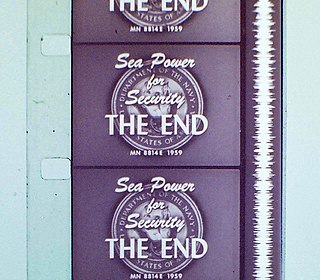
A soundtrack is recorded sound accompanying and synchronised to the images of a book, drama, motion picture, radio program, television program, or video game; colloquially, a commercially released soundtrack album of music as featured in the soundtrack of a film, video, or television presentation; or the physical area of a film that contains the synchronised recorded sound.

Odds & Sods is an album of studio outtakes by British rock band the Who. It was released by Track Records in the UK and Track/MCA in the US in October 1974. Ten of the recordings on the original eleven-song album were previously unreleased. The album reached No. 10 on the UK charts and No. 15 in the US.
Drone music, drone-based music, or simply drone, is a minimalist genre of music that emphasizes the use of sustained sounds, notes, or tone clusters called drones. It is typically characterized by lengthy compositions featuring relatively slight harmonic variations. La Monte Young, one of its 1960s originators, defined it in 2000 as "the sustained tone branch of minimalism". Music containing drones can be found in many regional traditions across Asia, Australia, and Europe, but the genre label is generally reserved for music originating with the Western classical tradition. Elements of drone music have been incorporated in diverse genres such as rock, ambient, and electronic music.
Joshua Kit Clayton, better known by his stage name Kit Clayton, is a San Francisco-based electronic and digital musician and computer programmer. He is a developer at San Francisco software company Cycling '74, helping create the Max/MSP MIDI/audio programming environment. He is also a significant contributor to Jitter, the multi-dimensional data set processing and visualizing architecture for audio, video, and 3D graphics. Clayton uses Max, MSP, and Jitter extensively in his own abstract musical compositions, which have been described as including aspects of ambient computer music and glitch.

Anthem of the Sun is the second album by rock band the Grateful Dead, released in 1968 on Warner Bros/Seven Arts. It is the first album to feature second drummer Mickey Hart. The band was also joined by Tom Constanten, who contributed avant-garde instrumental and studio techniques influenced by composers John Cage and Karlheinz Stockhausen. The album was assembled through a collage-like editing approach helmed by members Jerry Garcia and Phil Lesh, in which disparate studio and live performance tapes were spliced together to create new hybrid recordings. The band also supplemented their performances with instruments such as prepared piano, kazoo, harpsichord, timpani, trumpet, and güiro. The result is an experimental studio amalgam that is neither a pure studio album nor a live album.
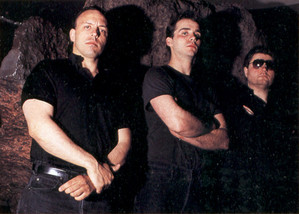
Controlled Bleeding was an experimental music group based in Massapequa, New York. The group was founded by Paul Lemos, the group's only consistent member. Most of Controlled Bleeding's released recordings feature two main collaborators, Chris Moriarty and vocalist Joe Papa, who both died in the late 2000s. In February 2020 Lemos announced that the band had dissolved.

Blemish is the sixth studio album by British singer-songwriter David Sylvian, released in May 2003 on Sylvian's Samadhisound label.

Irrlicht is the first album by Klaus Schulze. Originally released in 1972, in 2006 it was the sixteenth Schulze album reissued by Revisited Records as part of a series of Schulze album reissues. Recorded without a synthesizer, Irrlicht's set of "early organ drone experiments" is "not exactly the music for which KS got famous".

Vein is the thirteenth album by Japanese experimental band Boris. The album was released on vinyl in October 2006 through Important Records and was limited to 1500 copies only. Vein became somewhat controversial for the long delays prior to the release but most importantly for presenting two different albums under the album's title. As the label in charge of the release explained, "Every aspect of this beautiful release was planned and designed by Boris and they have stated that it has very special meaning for them".

Soliloquy for Lilith is an album by English experimental project Nurse with Wound, originally released in 1988 by the label Idle Hole that had been created for the album's release by project leader Steven Stapleton, and later reissued several times by varying record labels. It is considered one of the project's greatest albums, as well as a long-standing industrial drone record best known for its chance method of composition. FACT ranked it the 54th best album of the 80s with Aaron Turner of Isis calling it "one of the most listenable and enduring albums from the vast NWW catalog".

Mullah Said is a studio album by British experimental musician Bryn Jones, best known under the name of his primary musical project Muslimgauze. It was released in July 1998.
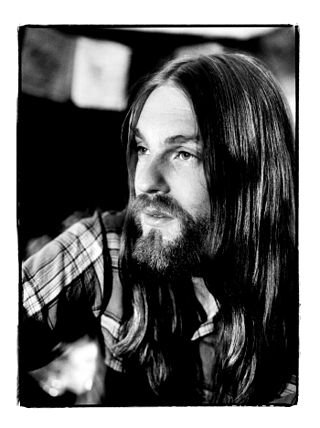
Alexander Tucker is an English musician from Kent who writes, records and performs alone and in collaboration with a varied array of artists. One critic writes that "Tucker sounds like he’s following a tradition that has long been neglected, focusing not on ageless songs and ideas but on ageless feelings captured through his droning miasma of acoustic guitar and mandolin." His first musical position was singing in hardcore band Suction in the early 1990s, who according to Tucker "played noisy adolescent punk with leanings towards Swans and Fugazi." His next job was as vocalist of post-rock hardcore 5-piece Unhome who released one album Short History of Houses (Unlabel) and a split single with Papa M. Unhome split in late 1999 and Tucker went on to tour the UK with Detroit space-rockers Fuxa, playing guitar synthesizers.
centrozoon is a German electronic improvisational music group. The core members are Markus Reuter and Bernhard Wöstheinrich. The group's music is flexible and has altered from album to album, but frequently-used elements include ambient music, improvisation, electronica, progressive rock and IDM.

Astral Disaster is a studio album by Coil, originally released in January 1999 on Acme/Prescription, reissued in 2000 on Threshold House, and then reissued in 2017 through Acme/Prescription.

Paix is the fourth studio album by French singer Catherine Ribeiro and her third with the band Alpes. It was originally released in 1972 by Philips Records.
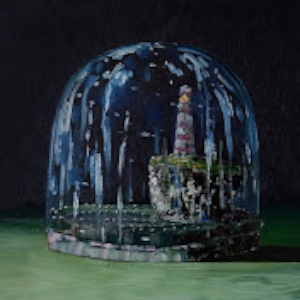
The soundtrack for Patience (2012), a film by Grant Gee, was composed and produced by English musician Leyland James Kirby under his ambient music project the Caretaker. The official soundtrack album was issued on 23 January 2012. Unlike other albums of the Caretaker that used old recordings of playful and bright ballroom music, Kirby's score for the film uses a 1927 recording of Franz Schubert's song cycle for voice and piano Winterreise (1828) as its main audio source. It also differs from other works of the project where hissing sounds are used instead of crackles, the loops are shorter in lengths, and the non-musical aspects of each track serve as the foreground of the mix. The soundtrack was favorably received by professional music journalists.
Vincent Akira Rabelais Carté is an American composer, poet, software programmer and experimental multimedia artist. He is most known for his 2004 record on Samadhi Sound, Spellewauerynsherde, as well as his experimental audio processing software Argeïphontes Lyre, and his works which take inspiration from magic realism.

Persistent Repetition of Phrases is the seventh studio album by the Caretaker, an alias of musician Leyland Kirby. Released on 1 April 2008, it was his first record to cover themes of Alzheimer's disease. The album was also the first Caretaker release to present looping of short segments within tracks. It marked Kirby's change of record labels from V/Vm Test to History Always Favours the Winners, which he felt might have helped with the record's success.

Going Places is an album by the American experimental music band Yellow Swans, released on March 2, 2010, by Type Records. It is the final album by the band, released after the band's 2008 breakup. Following the decision to disband in late 2007, the duo decided that making the final album was a priority. Yellow Swans spent a total of 18 months working on the album, first recording 80–100 hours of material during the rehearsals for their final shows, and then progressively editing the recordings down to the album's final runtime.
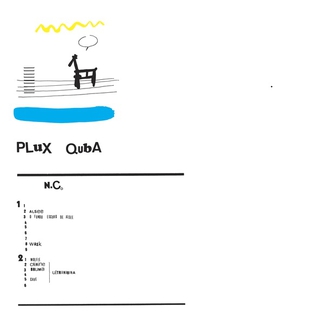
Plux Quba: Música Para 70 Serpentes, frequently shortened to Plux Quba, is the sole studio album by Portuguese experimental musician Nuno Canavarro. Originally released on the private press label Ama Romanta in 1988, it was expanded and reissued in 1998.
















